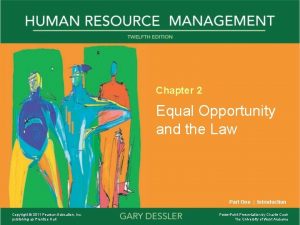Equal Credit Law Opportunity Consumer Equal Credit Opportunity





- Slides: 5

Equal Credit Law Opportunity Consumer Equal Credit Opportunity By: Victoria Alvarado & Natalie Romero

Background � The Riggs National Bank of Washington, D. C. , loaned more than $11 million to Samuel Linch and Albert Randolph. To obtain the loan, Linch and Randolph provided personal financial statements. Linch's statement included substantial assets that he owned jointly with his wife, Marcia. As a condition of the loan, Riggs required that Marcia, as well as Samuel and Albert, sign a personal guaranty for repayment. When the borrowers (Samuel, Randolph and Marcia) defaulted, Riggs filed a suit in federal district court to recover its funds, based on the personal guarantees. The court ruled against the borrowers, who appealed.

1. Did the bank violate the Equal Credit Opportunity Act. Yes or no, why or why not? ECOA, 15 U. S. C. § 1691 states, "shall be unlawful for any creditor to discriminate against any applicant, with respect to any aspect of a credit transaction, . . . on the basis of. . . marital status. . “ No, the bank did not violate the ECOA because the EOCA further provides that “a creditor shall not require the signature of an applicant’s spouse…. , other than a joint applicant, on any credit instrument if the applicant qualifies under the creditor’s standards of creditworthiness or the amount and terms of the credit requested. ” In the instant case the court found that Riggs had properly determined that Samuel Linch was not independently creditworthy for the requested loan before it required Marcia Linch to be a guarantor. Moreover, Riggs had not requested that Marcia be a guarantor only until after learned that substantial of the personal assets listed in the financial statement submitted with the original application, were not individually owned by Samuel Linch. Many of the assets listed on the financial statement were owned jointly by Samuel and his wife. Thus the district court ruled that Riggs had not violated the EOCA in any of its dealings with appellants. �

2. Find the place in your book, page number, and what is says to answer this case problem. � On page 888 in the 12 th Edition Business Law book. The book states that, “Under the ECOA, a creditor may not require the signature of an applicant’s spouse, except as a joint applicant. On a credit instrument if the applicant qualifies under the creditor’s standards of credit worthiness…”

3. Then look at the case at Riggs National Bank of Washington D. C. v. Linch, 36 F. 3 d 370 (4 th Cir. 1994) - and state the court's ruling, in whose favor, the Bank or the Borrowers, and why, and the legal rule the court applied. In Riggs National Bank of Washington D. C. v. Linch, the court found that the bank, Riggs did not violate the ECOA in its dealings with the borrowers, Samuel, Marcia and Albert, because it had properly and contemporaneously determined that Samuel Linch was not creditworthy for the loan requested. The borrowers argued that the bank violated the ECOA regulations by requiring Mrs. Linch to execute a personal guaranty of the Note. However, Riggs had made this requirement only after it had determined that Mr. Linch did not qualify by himself for the amount of the loan. Moreover, the court found even if Riggs had violated ECOA, it could not be raised as an affirmative defense to Riggs’ claims for personal guarantees. As such, the court further ruled Randolph lacked a standing to assert an ECOA claim since Riggs’ had not required Randolph’s spouse to be a guarantor of the note. The court relied on the well-established ECOA, 15 USC, Section 1691, that ‘prohibit a creditor from requiring a spouse’s signature on a note when the applicant individually qualifies for the requested credit’, also stated in Anderson v. United Finance Co. , when it determined that the bank provided sufficient proof of their claim that Mr. Linch did not independently qualify for the loan without the joint property held with Mrs. Linch. Therefore the court ruled in favor of Rigg’s.









